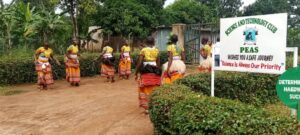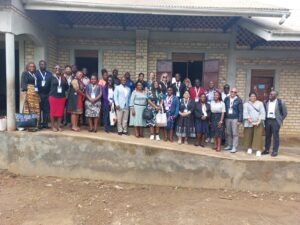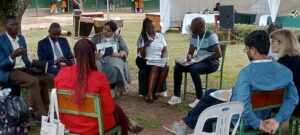Focussed on secondary education in Uganda for over 15 years, PEAS Uganda was excited to host other secondary implementers to share our experiences working in different contexts.
Global Schools Forum bought together 22 participants from 14 organisations across 8 countries to discuss what it means to deliver quality, inclusive secondary education for all. This was the first Secondary Education Study Tour in Uganda, and PEAS were honoured to be hosting this team of implementers in our PEAS school and PEAS government partner schools.
Why was the Secondary Education Study Tour so important?
In Uganda, only 1 in 4 adolescents are enrolled in secondary school[1]. Of those in school, 1 in 10 of have learned the basics[2]. When speaking on the panel during the Study Tour, Hawah Nabbuye, Managing Director at Educate! Uganda, noted that “Uganda has the right policies, but closing the gap between policies and implementation is the challenge”. PEAS recognises this gap, and we’re working to address it. Since 2019, we’ve been partnering with Uganda’s Ministry of Education and Science (MoES) to bring together best practice and experience from running PEAS Uganda’s 30 secondary schools and MoES’s approaches and goals to find solutions.
What happened on the tour?
The Study Tour offered a deep dive into Uganda’s secondary education landscape, providing an opportunity to explore the challenges and opportunities in the sector. On Day 1, participants visited a Building Tomorrow School. On day 2, PEAS hosted the team in a PEAS secondary school and two of the schools that we partner with under the Inspect and Improve Programme; one of which is run by School for Life. These visits showcased the rural context of these schools and the innovative interventions that are driving learning. Expert-led panel discussions, including contributions from the Principal Education Officer at the Ministry of Education and PEAS Uganda’s Country Director, offered insights into how public policy, funding efforts, and non-state operators are strengthening secondary education in Uganda.
From school visits to long car journeys, there was a lot of time for talk. We’ve gathered together a few of the key thoughts and observations from the study tour team:
- Focus on foundational learning at every level, and for all students. Students who leave primary school without basic skills will struggle at secondary school, and are more likely to drop out. We need innovative solutions that support those at risk, and we were inspired by Building Tomorrow’s work. Their Roots to Rise Programme provides targeted support to students at their level, and has been adapted to reach those who can’t access school through a programme using basic mobile phones.
- Involve the community. As Olanrewaju Oniyitan from SEED Care and Support Foundation aptly summarised, we “cannot influence the community without involving the community”. Enrolling students in school, and supporting them to complete school, depends on parents and community members. Building Tomorrow’s approach, which trains community members to become education advocates, demonstrates the power of community engagement in reintegrating out-of-school children.
- Prioritise partnerships. We need stronger, more consistent education systems at every level. Where top priority is given to student safety and learning. To achieve this, we need to prioritise partnerships; across siloed sectors, between non-state providers and governments, and between school leaders and Local Education Officers. PEAS partners with School for Life and Uganda’s Directorate of Education Standards to drive improvements at Mbazzi Riverside High School, as well as other government schools part of PEAS and DES’ Inspect and Improve Programme.
- Integrate relevant career readiness. We need to equip students with a universal set of core skills that are relevant to their context both in school and beyond. With the right skills and knowledge of what’s out there, students can successfully transition into upper secondary school, TVET, employment or entrepreneurship. At PEAS schools, we provide gender inclusive career guidance to ensure girls are encouraged to pursue any career of their choice and break away from traditionally female-dominated roles or sectors.
Global School Forum’s Secondary Education Study Tour in Uganda was a valuable opportunity to reflect on the current state of secondary education in Uganda and explore how we, as implementers, are seizing the opportunities and addressing the challenges. We are grateful to Global Schools Forum for organizing this enriching experience and we’re looking forward to continuing these conversations and collaborative efforts to strengthen secondary education so that it delivers more for young people in Uganda.
[1] EPCD (2018) National Education Profile: Uganda. Available here. https://www.epdc.org/sites/default/files/documents/EPDC_NEP_2018_Uganda.pdf
[2] World Skills Clock. Available here. https://skillsclock.io/


